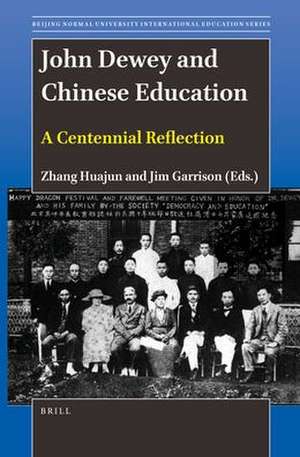John Dewey and Chinese Education: A Centennial Reflection: Beijing Normal University International Education Series, cartea 1
Huajun Zhang, Jim Garrisonen Limba Engleză Paperback – 14 mar 2022
By reviewing this historical event, we also find new space to reinterpret Eastern philosophies such as Confucianism and Buddhism. We find that there’s some surprising commonalities shared by Confucianism, Buddhism, and Deweyan pragmatism that provide possibilities for seeking a more inclusive conceptual framework for education in the West as well as the East.
Preț: 282.82 lei
Nou
Puncte Express: 424
Preț estimativ în valută:
54.12€ • 56.65$ • 45.04£
54.12€ • 56.65$ • 45.04£
Carte indisponibilă temporar
Doresc să fiu notificat când acest titlu va fi disponibil:
Se trimite...
Preluare comenzi: 021 569.72.76
Specificații
ISBN-13: 9789004511453
ISBN-10: 9004511458
Dimensiuni: 155 x 235 mm
Greutate: 0 kg
Editura: Brill
Colecția Brill
Seria Beijing Normal University International Education Series
ISBN-10: 9004511458
Dimensiuni: 155 x 235 mm
Greutate: 0 kg
Editura: Brill
Colecția Brill
Seria Beijing Normal University International Education Series
Notă biografică
Zhang Huajun is an Associate Professor of Education at Beijing Normal University. Her major publications are on philosophy of education and teacher education in English and Chinese, including John Dewey, Liang Shuming and China’s Education Reform: Cultivate Individuality (Lexington, 2013).
Jim Garrison is a Professor of Philosophy of Education at Virginia Tech University. Although he has widely published in many fields, his specialty is pragmatism, especially the pragmatism of John Dewey. Jim has books and papers in eleven languages.
Jim Garrison is a Professor of Philosophy of Education at Virginia Tech University. Although he has widely published in many fields, his specialty is pragmatism, especially the pragmatism of John Dewey. Jim has books and papers in eleven languages.
Cuprins
Acknowledgements
List of Images and Tables
1 The Revival of Confucian Education in Study Halls and Academies
1.1 Confucian Education Emerging from Historical Discontinuities
1.2 Popular Confucian Revival and Agency in the Classics-Reading Movement
1.3 Wang Caigui and the Movement’s Underlying Intellectual Construction
1.4 Links to the Confucian Revival on Political and Academic Levels
2 Dynamics of Utopianism: Confucian Visions in Response to Social Problems
2.1 Criticism of Public Education and Its Historical Derivation
2.2 Criticism of Society and the Classics as a Solution
2.3 Personal Experiences and Turning Points to Classics-Reading Education
2.4 Group Solidarity in Classics-Reading Activities
3 Grounding Classics-Reading Education in Ideal Learning Environments
3.1 Nature, Naturality, and the Ideal Physical Environment for Education
3.2 The Family, Parenting, and Ideal Social Environments for Education
4 Self-Cultivation and a Regulated Lifestyle in Study Halls and Academies
4.1 Elements of Classics-Reading Practice
4.2 Shaping the Body and Forming the Self: Rules and Discipline
4.3 The Spiritual Dimension of Life in Study Halls and Academies
5 The Movement’s Political Implications and Potential for Social Change
5.1 The Child in Classics-Reading Education: Empowered or Lacking a Future?
5.2 The Adult Activist: Potential and Limits of Social Change
Appendix
References
List of Images and Tables
1 The Revival of Confucian Education in Study Halls and Academies
1.1 Confucian Education Emerging from Historical Discontinuities
1.2 Popular Confucian Revival and Agency in the Classics-Reading Movement
1.3 Wang Caigui and the Movement’s Underlying Intellectual Construction
1.4 Links to the Confucian Revival on Political and Academic Levels
2 Dynamics of Utopianism: Confucian Visions in Response to Social Problems
2.1 Criticism of Public Education and Its Historical Derivation
2.2 Criticism of Society and the Classics as a Solution
2.3 Personal Experiences and Turning Points to Classics-Reading Education
2.4 Group Solidarity in Classics-Reading Activities
3 Grounding Classics-Reading Education in Ideal Learning Environments
3.1 Nature, Naturality, and the Ideal Physical Environment for Education
3.2 The Family, Parenting, and Ideal Social Environments for Education
4 Self-Cultivation and a Regulated Lifestyle in Study Halls and Academies
4.1 Elements of Classics-Reading Practice
4.2 Shaping the Body and Forming the Self: Rules and Discipline
4.3 The Spiritual Dimension of Life in Study Halls and Academies
5 The Movement’s Political Implications and Potential for Social Change
5.1 The Child in Classics-Reading Education: Empowered or Lacking a Future?
5.2 The Adult Activist: Potential and Limits of Social Change
Appendix
References


